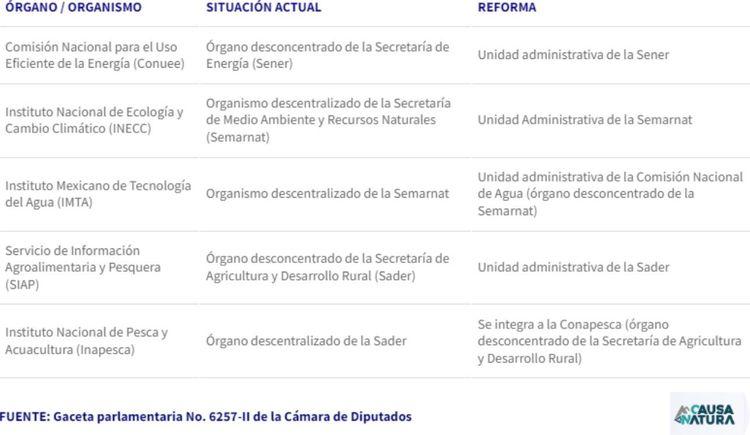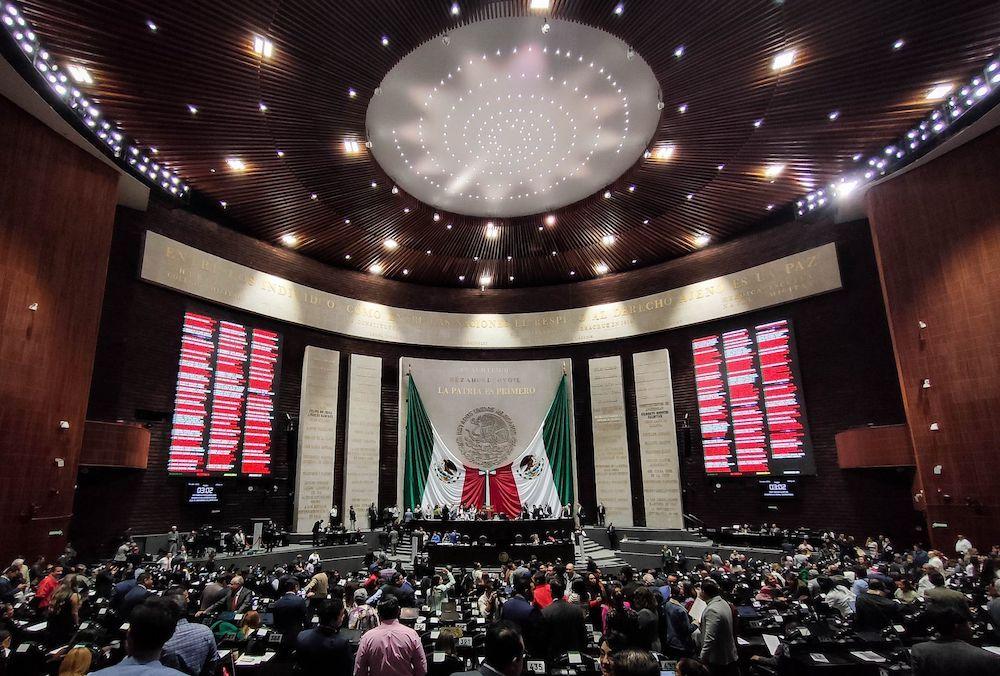The government of President Andrés Manuel López Obrador has been characterized by promoting a restructuring of the federal public service through a series of legislative initiatives.
This process accelerates as the six-year term comes to an end, in a year and a half, which will renew the presidential power and both houses of Congress.
Public opinion is currently focused on three initiatives that disrupt access to information and the development of science and technology to address the climate crisis where it seems that, under the argument of making budgetary savings, the institutions responsible for information and research are being disarmed for decision-making on environmental issues and thus redirecting those resources to social programs.
Cristina Rivas de Humint, a consulting firm that has monitored public policy in the environmental sector, pointed out that the current administration has supported the instruction to make resources efficient in the public administration, and under this argument these initiatives are presented, however, these budgetary savings are made to fund the welfare programs of the federal government.
For José Lara, director of the Transdisciplinary University Center for Sustainability (Centrus) of the Ibero-American University, the entire institutional structure that is not related to the priorities of the government and which, from his perspective, struggles to remain in power through a client system, in which he cares for his voter base, is being disarmed.
Dismantling research on environmental issues
The first of these is an initiative with a draft decree that consists of merging, integrating or extinguishing 18 bodies, of which five have a significant impact on environmental issues.

It was presented in the Chamber of Deputies at the last session, which ended in April, and is awaiting discussion and ruling. If it is voted favorably by the plenary, it will go through the same process in the Senate of the Republic.
This initiative reduces administrative units subordinate to these five bodies (shown in the table above), which for Rivas means a loss of priority for environmental issues.
“Speaking specifically in the case of the National Institute for Ecology and Climate Change (INECC), it's definitely a weight loss on the government's agenda. It means that if it wasn't in the top of government priorities in itself, right now they're not going to be,” he said.
In addition, these institutes, mostly of an investigative nature, when absorbed by other institutions, will lose their force of impartiality and there will no longer be checks and balances that favor decision-making based on scientific evidence, but will run the risk of being subordinated to the political context or social pressures.
José Lara pointed out that these bodies served as an interface between the public and the academy, and what the initiative will do is to disarm, discourage and prevent the generation of technical and scientific information and cut bridges of communication, work and collaboration between the private sector, academia, government and civil society.
What it does is weaken research on climate change, creating biases in research in fisheries and aquaculture, at times of fishing, climate, water and food crises, said Esteban García-Peña, director of fisheries at the organization Oceana.
Organized resistance in the IMTA
Of these organizations, the Mexican Institute of Technology and Water (IMTA) has the greatest resistance to reform, since its workers who are dedicated to technological research and development are organized in a union, says Jorge Salgado, general secretary of the latter organization.
“We have tried to get in touch with these 18 public bodies but we haven't been successful. I understand that not everyone is constituted or organized in a union, that is an advantage that we have in the IMTA and good since 2021, when its extinction was announced, because we have taken steps to prevent this initiative from prospering,” he said.
The arguments on which the Executive has supported this reform have been corruption within agencies, to which Salgado points out that in this case those responsible are being prosecuted; the second is the duplication of functions, however, Conagua is an operational and administrative entity responsible for water resources, while the IMTA develops science and technology and trains professionals in water issues; and finally, he points out that economic savings are not founded, since the federation would have to contribute the 250 million that the IMTA obtains by their own means through the sale of projects for their maintenance, which means more budgetary burden.
In addition, the IMTA is currently an impartial body in water disputes and makes diagnoses with scientific and technological information, so if it loses its legal status and becomes subordinate to Conagua, the country would lose an impartial legal figure and Conagua would be a judge and party to these controversies, which represents for Salgado a 20-year setback in water development and jeopardizes the country's security in this area.
The Law of Science
Another initiative of the federal executive that has just been published in the Federal Official Gazette (DOF) is the General Law on Humanities, Science, Technologies and Innovation (HCTI), which transforms the National Council for Science and Technology (Conacyt) into the National Council for Humanities, Sciences and Technologies (Conahcyt).
Cristina Rivas points out that this initiative had been under discussion for more than two years, however, it seems that a good consensus was not achieved because a large sector of scientists and academics are unhappy with the lack of integration of their opinions into it.
In this case it is a refoundation, he mentions, since more powers are added, more specificities of information, but in essence it is the same institution with changes.
In this case, what has generated the most debate in public opinion has been the admission of the Secretariat of Defense and the Secretariat of the Navy to the Advisory Council, a supervisory and consultative body of the now Conacyt.
With this, Rivas points out, the generation of science and technology in the armed forces is recognized and integrated into a national science structure, but at the same time this increases the participation of government agents in decision-making and social decision (academia, private sector and citizenship in general) is lost in the direction of science and the federal government gains greater control and centralization in decision-making in scientific matters.
As a result, there is a risk that there is a line where science should go and that it is in line with the priorities of the government and not what the country needs; and on the subject of the environment, because it is not a priority for the government, that there are no lines of research related to climate change or the environment.
The extinction of the INAI
The third bill was presented by Deputy Manuel Alejandro Robles to the Standing Committee of the Mexican Congress and seeks to extinguish the National Institute for Transparency, Access to Information and Protection of Personal Data (INAI) and create the Institute for Government Transparency.
The proposal was submitted after the Senate rendered INAI inoperative by not naming at least one of the three missing commissioners. Something essential for them to meet and resolve issues related to access to information.
For his part, the Morenista senator Alejandro Armenta presented an initiative that dissolved the INAI and attributed its functions to the Secretariat of the Public Service, but this was withdrawn.
Rivas mentions that these initiatives are part of this administration's intention to carry out a profound reform of the system of autonomous constitutional bodies, and could mean the rupture of autonomy and accountability.
The counterweight function of autonomous bodies is essential, for example, to comply with the Escazú Agreement, a Regional Agreement on Access to Information, Public Participation and Justice in Environmental Matters, to which Mexico is a signatory.
The Paradigm Shift
In general, the common denominator of these initiatives is the centralization of decision-making, breaking with efforts and the previous logic of increasing social participation in decision-making, Cristina Rivas points out.
José Lara pointed out that organizations will enter political cycles, which is extremely risky, since political cycles respond in the short and medium term, while environmental problems are medium and long term, hence the importance of having institutions that are not linked to these cycles but that are being lost.
However, he points out that on the part of the academy there is an opportunity to seek other sources of advocacy and funding that do not come from the federal government for research and thus continue to promote projects that help to advance the 17 Sustainable Development Goals (SDGs) to which Mexico has committed itself within the framework of the 2030 Agenda for Sustainable Development.
While for Rivas, with no desire to defend reforms, regardless of where the dependencies are located within the institutional organization chart, environmental challenges depend, above all, on sufficient budget, will and commitment to fulfill them and to generate alliances on the part of the federal government.



Comentarios (0)